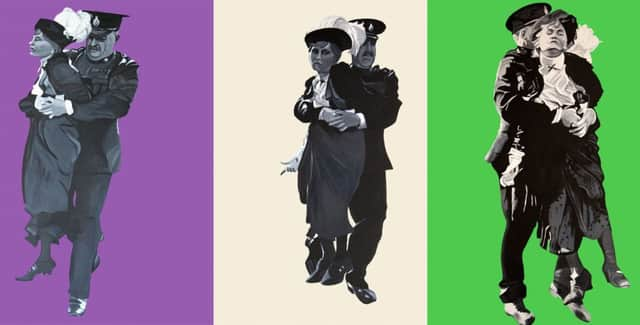Author's visit to Callendar House will tell story of Scottish Suffragettes


But that wasn’t the worst of it – the angry crowds had heard the suffragettes, who refused to eat or drink, were often unable to be fed by a pipe through the nose and so other, even less seemly ways were found to force nutrients into them.
“People were horrified,” said novelist Ajay Close, who tells the incredible story of the Scottish suffragettes in her historical novel, A Petrol Scented Spring.
Advertisement
Hide AdAdvertisement
Hide AdStill shocking today, in the early 19th century, it was scandalous and drew outraged protesters from all over Scotland to Perth Prison where they voiced their loud disapproval.


“Thousands of women poured into Scotland, protesting and picketing at the gate,” said Ajay.
“The atmosphere must have been amazing.”
Many of those who came to protest about the undignified– and highly dangerous – method of feeding the women would not have actually approved of what had led them to be jailed.
“They were incredibly brave women,” Ajay said, “but in 2017 they’d be called terrorists.”


Advertisement
Hide AdAdvertisement
Hide AdLike many, the author had always been interested in the Suffragettes but her knowledge didn’t go much past the “old cliches” of women chaining themselves to the railings and, most famously, Emily Davison being trampled by the king’s horse at Epsom race course.
An award-winning journalist, who became a successful novelist and playwright, Ajay had been looking for a new subject for a play, when the story of the Scottish suffragettes came to mind.
She wanted to find out more and, as she uncovered the story, she was amazed and thrilled at what she found – a gift for any writer.
Ajay discovered what the Scottish women involved did was extraordinary – they were arsonists. Arabella Scott set fire to a racecourse stand in Kelso; Frances Gordon to a mansion in Rutherglen; Maude Edwards stuck a hatchet in the King’s portrait in Edinburgh, and Fanny Parker tried to blow up Rabbie Burns’ cottage in Alloway.
Advertisement
Hide AdAdvertisement
Hide AdWhen imprisoned, they would go on hunger strike and be released quickly, on condition that they reported back to the authorities.
They never did, of course, and so began the game of ‘cat and mouse’ they played so well.
Eventually, the authorities got tired of this and decided the women would be forced to eat.
In England, no doctor could be found to implement this policy but north of the border, one doctor agreed.
Advertisement
Hide AdAdvertisement
Hide AdDuring her research, Ajay not only uncovered all of the doctor’s notes from the time, held in the national archive, she also managed to track down his and Arabella’s relatives and talked to them.
“The sort of information I found was once in a lifetime information,” she said. “It spoiled me as a novelist.
“Everyone who was concerned with the story was absolutely fascinating.”
Doctor Hugh Ferguson Watson was the son of a tenant farmer.
Advertisement
Hide AdAdvertisement
Hide AdClever and capable, but with no means of supporting himself, he was forced to find employment that offered board and lodgings – which meant working in lunatic asylums and prisons.
The novel centres round the intense, complicated relationship of the ambitious young doctor and a strikingly beautiful and determined suffragette, Arabella Scott.
Ajay’s meticulous research revealed the doctor was almost certainly in love with his patient.
“Arabella was in solitary confinement for five weeks and during that time he didn’t leave the grounds,” explained Ajay.
Advertisement
Hide AdAdvertisement
Hide Ad“We know they had long conversations every day as he tried to persuade her to give up her hungerstrike.
“We also know about Stockholm syndrome: we know people often forge a bond with their captors. It’s very likely they formed some sort of attachment.”
Force feeding Arabella was successful – she had wide nasal passages that allowed the food to pass into her stomach.
The others involved were not so ‘fortunate’. Frances Gordon, fed by nutrient suppositories, came so close to death she was hastily bundled out of the prison to make sure she didn’t die on the premises.
Advertisement
Hide AdAdvertisement
Hide AdUnexpectedly, however, she recovered and went straight to the newspapers with the story, sparking the outraged scenes that unfolded at the prison gates.
A century on, these days, the five sufragettes would be called terrorists.
“We are quite conflicted about terrorism – and the truth is they were terrorists,” said Ajay.
“The official line is that the women got the vote in recognition of their war work.
Advertisement
Hide AdAdvertisement
Hide Ad“I think, though, the direct action and campaign was a crucial part of the picture. It made them an aggravation and meant sooner or later it had to be addressed.”
While the suffragettes might come from a different era – when long dresses were worn and cars were new and rare – they are closer to us than we might think.
“When you start looking at the letters they wrote, they’re just like us,” added Ajay.
l Ajay Close will speak at Callendar House, Falkirk, on March 18, 2-4pm. Tickets, £5.50 include tea/coffee and scone. To book tickets please contact 01324 506850 or Falkirk Stadium in person. Her visit to Falkirk ties in with a stunning exhibition that is now running in the Park Gallery. Deeds Not Words is a solo show by Clare Andrews, the artist who splits her life between Rio de Janeiro and Edinburgh. Commemorating the suffragettes and their struggle.
Advertisement
Hide AdAdvertisement
Hide AdThe pictures are big and bold, framed in the iconic colours of the suffrage movement - green, white and purple – they show the women and the direct action they took to make sure their cause was always in people’s minds.
The title – Deeds Not Words – is the phrase inscribed on the gravestone of Emily Davison, the suffragette who died flinging herself in front of the Kings horse in the 1913 Derby, an incident that has been painted by Andrews and is on display.
l A Petrol Scented Spring is published by Sandstone Press and available from Amazon.